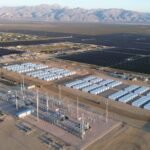Indiana is set to receive a significant boost in its EV charging infrastructure, thanks to the latest funding round from GOEVIN (Go Electric Vehicle Indiana). The organization has announced over $3.3 million in funding to support the development of 36 new charging projects across the state. This includes the installation of 18 DC fast charger sites and 18 Level 2 charging stations.
The funding for these projects comes from VW mitigation money, according to Carl Lisek, the executive director of Drive Clean Indiana. The DC fast chargers will be strategically located along Indiana’s designated Alternative Fuel Corridors, allowing drivers to access charging facilities 24/7 at travel centers, restaurants, and shopping areas along major highways. These corridors were established as part of the Biden administration’s National Electric Vehicle Infrastructure (NEVI) Formula Program to facilitate the installation of EV chargers at key locations along national highways.
Interestingly, Pilot Travel Centers, which had six DC fast charging sites on the initial NEVI selection list, now has eight sites on the GOEVIN list. The Level 2 chargers will be dispersed in locations where drivers park for longer periods, catering to both urban and rural communities. GOEVIN emphasizes that the chosen locations are highly visible and are supported by a combination of private and public investments.
While none of the applicants have signed contracts yet, construction on the new charging stations is expected to commence in the fall, with all 36 projects slated for completion by the end of 2026. Ryan Lisek, program director at Drive Clean Indiana, highlighted that these new charging sites will play a crucial role in supporting the growing number of electric vehicles on Indiana’s roads.
Earlier this year, GOEVIN embarked on a “Closing the Gap Tour” across eight cities in Indiana, showcasing the state’s existing EV infrastructure and promoting local electric fleet success stories. The tour aimed to encourage businesses and local governments to collaborate in filling in charging gaps across the state.
In conclusion, Indiana’s EV charging network is set to expand significantly with the development of these 36 new charging projects. The state’s investment in EV and battery manufacturing facilities, coupled with the upcoming charging infrastructure, will support the transition to electric vehicles and contribute to a cleaner and more sustainable transportation system.







